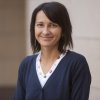Jelena Vuckovic is a professor in the Department of Electrical Engineering and Ginzton Laboratory at Stanford University, where she leads the Nanoscale and Quantum Photonics Lab. She received her PhD degree in Electrical Engineering from the California Institute of Technology (Caltech) in 2002, and M.Sc. and Diploma in Engineering degrees from Caltech and University of Nis, Serbia, respectively. Upon graduation from Caltech, she has held the following positions at Stanford University: a postdoctoral scholar (January-August 2002), an acting assistant professor (August-December 2002), an assistant professor (January 2003-August 2008), an associate professor of electrical engineering with tenure (September 2008- January 2013), and a professor of electrical engineering (since February 2013).
.
Vuckovic has received many awards including the Marko V. Jaric award for outstanding achievements in physics (2012), the Humboldt Prize (2010), the DARPA Young Faculty Award (2008), the Chambers Faculty Scholarship at Stanford (2008), the Presidential Early Career Award for Scientists and Engineers (PECASE in 2007), the Office of Naval Research Young Investigator Award (2006), the Okawa Foundation Research Grant (2006), and the Frederic E. Terman Fellowship at Stanford (2003).






